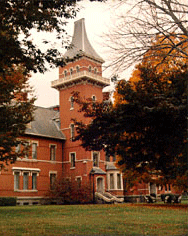APA President Paul Summergrad, M.D. (left), was among those in attendance when President Barack...
Former APA President and Visionary Robert Gibson, M.D., Dies
 |
Gibson was president of APA for the 1976-77 term and had been secretary of the Association from 1972 to 1975. He received his medical degree from the University of Pennsylvania Medical School and served his psychiatric residencies at the Veterans Administration Hospital in Coatesville, Pa., the U.S. Naval Hospital in Bethesda, Md., and the private mental hospital Chestnut Lodge in Rockville, Md. He remained at Chestnut Lodge as clinical administrator until 1960.
In 1960, Dr. Gibson moved to the Sheppard and Enoch Pratt Hospital in Baltimore as director of clinical services. He became medical director and CEO in 1963 and served in that position until 1982, when he was named president and CEO of the hospital.
APA leaders hailed Gibson as a leader who emphasized integrity, accountability, and public service. “Dr. Gibson was an example to us all—a man ahead of his time,” said APA CEO and Medical Director Saul Levin, MD., M.P.A. “Not only was he an exceptionally gifted psychiatrist, teacher, and administrator, he was key in earning the public’s trust in the profession, initiating a team approach to psychiatry, and ensuring that individuals from all backgrounds had access to psychiatric care. Let us honor Dr. Gibson for his vision and tireless leadership for patients.”
Past APA President Steven Sharfstein, M.D., who succeeded Gibson as president of the hospital in 1992, described him as a visionary who helped to introduce the idea of providing a continuum of services in a hospital setting. Sharfstein told Psychiatric News, “At Sheppard Pratt , a private, not-for-profit, long-stay hospital within the psychoanalytic tradition, he brought, during his 30-year tenure as president from 1962 to 1992, day programs, a community mental health center—the only one in the country at the time sponsored by a private psychiatric hospital—an education center, and an employee assistance program. He wrote and spoke widely on the economics of psychiatric care. He was a wonderful mentor to me when I joined Sheppard Pratt in 1986. As APA president in 1976, he fought for third-party coverage of psychiatric treatments, both inpatient and outpatient. He loved APA, our professional standards and ethics. Psychiatry has lost one of its best leaders.”





